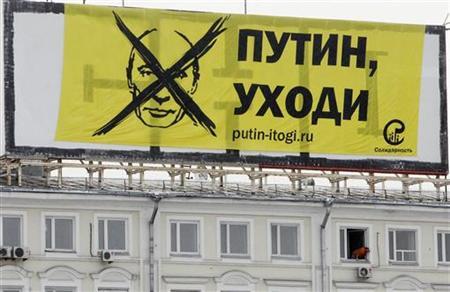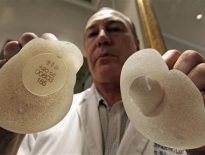(Reuters) – It took several minutes and a woolly hat to resolve the latest differences among the loose alliance of Russian opposition groups challenging Vladimir Putin’s 12-year rule.
Unable to agree on the order of a protest march through Moscow on Saturday, the organizers, gathered round a few tables shoved together in a crowded Moscow cultural centre, borrowed the hat from a woman bystander and drew lots from it.
A row was averted. Non-affiliated protesters will lead the march, increasing pressure on Putin to allow free elections and open up the political system, and they will be followed by liberals, right-wing groups and nationalists.
The many groups behind the biggest protests since Putin rose to power disagree on more than they agree on, and their chaotic meetings are often an exercise in conflict resolution.
Fearing the Kremlin will exploit any public differences, they are keeping their political demands and sensitive political discussions to a minimum to help maintain the fragile unity.
“A coalition as broad as this can only concentrate on achieving one goal,” said Maxim Blant, a journalist debating the protest movement with other civic activists during a political discussion one snowy evening this week.
“The groups involved all want a level playing field for political competition in Russia. This unites them even though they have different values otherwise. They understand the rules of the game – they must focus on the one goal that unites them.”
TEST OF MOMENTUM
Two opposition rallies in Moscow on December 10 and December 24 attracted tens of thousands of people angered by allegations of fraud in a parliamentary election on December 4 that was won by Putin’s ruling United Russia party.
Saturday’s march will test the opposition’s ability to keep up the momentum despite freezing weather, Putin’s refusal to meet their main demands and the prime minister’s all-but certain victory in a presidential election on March 4.
“We know that Putin will win on March 4. But we want to ensure he is naked and wet when he enters the Kremlin, with all respect for him gone,” said Sergei Parkhomenko, a journalist who is part of the organizing committee.
Protesters were also united by an announcement by Putin and President Dmitry Medvedev on September 24 that they plan to swap jobs after the presidential election, a move seen by many Russians as openly flouting democracy.
The protest movement has brought together such diverse figures as former chess champion and opposition politician Garry Kasparov, environmental campaigner Yevgenia Chirikova, anti-corruption blogger Alexei Navalny, who has expressed nationalist views, and left-wing leader Sergei Udaltsov.
None has emerged as the group’s leader although Navalny, 35, is widely seen as having the potential to step into that role. At the first organizational meeting, his seat, marked by a place name, was empty at the start because he had been jailed for 15 days for his role in an earlier protest in December.
One of the organizers, liberal politician Boris Nemtsov, served in government under President Boris Yeltsin but others, such as novelist Boris Akunin, have no experience of politics and are not affiliated with any political party.
Chirikova, who led a campaign to prevent the Khimki forest outside Moscow being bulldozed to make way for a highway, said the groups’ differences should not be seen as a weakness.
“Our campaign over Khimki forest brought together right-wing people, left-wing people, all sorts of people. That’s why we succeeded,” she said, explaining that the broad support base had made the authorities sit up and take notice.
CONFLICT RESOLUTION
When problems arise, the protest leaders have so far managed to get round them at their regular meetings staged in premises lent to them by sympathizers. Unable to agree on a list of speakers before the December 24 rally, they held a popularity poll on the Internet, allowing supporters to decide for them.
When Nemtsov and an ally, Vladimir Ryzhkov, called at the first meeting for the protesters to add a call for Putin to quit to their list of demands, they were shouted down by others who did not want to politicize the protests at that stage.
At times the discussions threaten to become heated.
Akunin’s concerns that it was too cold to have speeches at the end of Saturday’s march, and Udaltsov’s call for no political leaders to speak, were beaten back by others such as Ryzhkov and Nemtsov.
Such disputes have to be settled quickly to avoid opening deep-seated divides. Nemtsov, for example, is reviled by nationalists and leftists for his role in free-market reforms in the 1990s, when, they say, Russia sold its wealth too cheaply.
Liberals fear the nationalists will try to hijack the protests to press their calls for immigrants to leave the country, while leftists are just as wary of liberals’ beliefs in market reforms.
Any row would quickly grab the public’s attention. The protest organizers allow the media to attend their meetings and stream them on the Internet, even though much of the discussion focuses on mundane issues and the participants can often be seen looking bored and tapping away on their iPads or mobile phones.
Fears that the Kremlin could try to exploit any differences between the opposition forces mounted in December after a media outlet published a recording of telephone calls in which Nemtsov used profanities to describe Chirikova and derided supporters as “office plankton” who had never seen a riot policeman.
Nemtsov said the recordings were partly falsified and intended to deter support and split the opposition.
“They will not succeed: it will have the opposite effect and more people will come out,” he said at the time.
COMPETING PROTESTS
The main opposition protests were suspended over the long New Year holiday, when Russia comes to a halt, and Saturday’s march to a square across the Moscow River from the Kremlin will show whether the opposition can still mobilize large crowds.
A few isolated opposition protests have taken place since December. A banner reading “Putin, go away” was erected on a rooftop near the Kremlin on Wednesday [ID:nL5E8D123M] and hundreds of people on Sunday drove cars trailing white ribbons, the protest symbol, to show defiance of Putin. [ID:nL5E8CT0CK]
So far, 26,000 people have registered for Saturday’s protest on social network sites, the organizers say, but some registered weeks ago and their commitment cannot be taken for granted after temperatures fell below -20 degrees Celsius (-4 Fahrenheit) in Moscow this week.
Putin’s supporters also plan a rally at the same time in another part of the capital but it is not expected to attract as many people as the opposition protest.
Novelist Akunin said support for the protest movement was growing but the weather would be an important factor.
“Wrap up well and bring some hot tea,” Nemtsov said, offering some advice to protesters.
The protest organizers have agreed to repeat the demands Putin has ignored – a rerun of the parliamentary election, the release of prisoners jailed for political reasons, reform of the political system, dismissal of the central election commission chief and registration of more political parties.
A key demand was added without any dissent among the opposition groups at the latest meeting – sympathizers should be urged not to cast a single vote for Putin on March 4.
One committee member, Olga Romanova, said funds were running low and this could affect efforts to arrange a video and sound system for speakers at the end of the march.
One of the organizing committee drew attention to the need to mobilize support outside Moscow – a key issue because Putin, president from 2000 until 2008 and prime minister since then, has stronger support outside the big cities.
PUTIN ON COURSE FOR VICTORY
Opinion polls show Putin, a former KGB spy, will win the election although he acknowledged on Wednesday that he might not win in the first round.
Putin, 59, has outlined token political reforms in response to the protests but has also mocked the demonstrators – saying they lack leadership and goals, and suggesting they are funded by foreign governments. The opposition denies the allegation.
Putin has also likened the white ribbons the protesters wear to condoms, and a decision by election officials to prevent liberal leader Grigory Yavlinsky running for president was seen by the opposition as Putin laying down the gauntlet.
“Something has changed in Russia and only people like Putin – one person living in a bunker – could say it hasn’t,” Chirikova said. “People have realised there is no chance of change coming from above, from Putin.”
(Editing by Elizabeth Piper)




